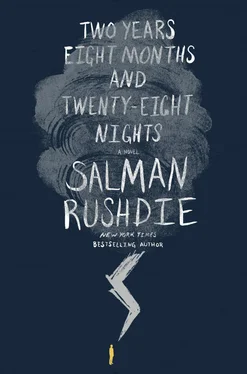As Dunia filled up with children and then emptied them into the small house, there was less room for Ibn Rushd’s excommunicated “lies.” Their moments of intimacy decreased and money became a problem. “A true man faces the consequences of his actions,” she told him, “especially a man who believes in causes and effects.” But making money had never been his forte. The horse-trading business was treacherous and full of cutthroats and his profits were small. He had many competitors in the tinaja market, so prices were low. “Charge your patients more,” she advised him with some irritation. “You should cash in on your former prestige, tarnished as it is. What else have you got? It’s not enough to be a baby-making monster. You make babies, the babies come, the babies must be fed. That is ‘logic.’ That is ‘rational.’ ” She knew which words she could turn against him. “Not to do this,” she cried triumphantly, “is ‘incoherence.’ ”
(The jinn are fond of glittering things, gold and jewels and so on, and often they conceal their hoards in subterranean caves. Why did the jinnia princess not cry Open at the door of a treasure cave and solve their financial problems at a stroke? Because she had chosen a human life, a human partnership as the “human” wife of a human being, and she was bound by her choice. To have revealed her true nature to her lover at this late stage would have been to reveal a kind of betrayal, or lie, at the heart of their relationship. So she remained silent, fearing he might abandon her. But, in the end, he left her anyway, for human reasons of his own.)
There was a Persian book called Hazar Afsaneh, or One Thousand Stories, which had been translated into Arabic. In the Arabic version there were fewer than one thousand stories but the action was spread over one thousand nights, or, because round numbers were ugly, one thousand nights and one night more. He had not seen the book but several of its stories had been told to him at court. The story of the fisherman and the jinni appealed to him, not so much for its fantastic elements (the jinni from the lamp, the magic talking fishes, the bewitched prince who was half man and half marble), but for its technical beauty, the way stories were enfolded within other stories and contained, folded within themselves, yet other stories, so that the story became a true mirror of life, Ibn Rushd thought, in which all our stories contain the stories of others and are themselves contained within larger, grander narratives, the histories of our families, or homelands, or beliefs. More beautiful even than the stories within stories was the story of the storyteller, a princess called Shahrazad or Scheherazade, who told her tales to a murderous husband to prevent herself from being executed. Stories told against death, to civilize a barbarian. And at the foot of the marital bed sat Shahrazad’s sister, her perfect audience, asking for one more story, and then one more, and then yet another. From this sister’s name Ibn Rushd got the name he bestowed on the hordes of babies issuing from his lover Dunia’s loins, for the sister, as it happened, was called Dunyazad, “and what we have here filling up this house with no light and forcing me to impose extortionate fees on my patients, the sick and infirm of Lucena, is the arrival of the Dunia-zát, that is, Dunia’s tribe, the race of Dunians, the Dunia people, which, being translated, is ‘the people of the world.’ ”
Dunia was deeply offended. “You mean,” she said, “that because we are not married our children cannot bear their father’s name.” He smiled his sad crooked smile. “It is better that they be the Duniazát,” he said, “a name which contains the world and has not been judged by it. To be the Rushdi would send them into history with a mark upon their brow.” She began to speak of herself as Scheherazade’s sister, always asking for stories, only her Scheherazade was a man, her lover not her brother, and some of his stories could get them both killed if the words were accidentally to escape from the darkness of the bedroom. So he was a sort of anti-Scheherazade, Dunia told him, the exact opposite of the storyteller of The Thousand Nights and One Night: her stories saved her life, while his put his life in danger. But then the Caliph Abu Yusuf Yaqub was triumphant in war, winning his greatest military victory against the Christian king of Castile, Alfonso VIII, at Alarcos on the Guadiana River. After the Battle of Alarcos, in which his forces killed 150,00 °Castilian soldiers, fully half the Christian army, the Caliph gave himself the name Al-Mansur, the Victorious, and with the confidence of a conquering hero he brought the ascendancy of the fanatical Berbers to an end, and summoned Ibn Rushd back to court.
The mark of shame was wiped off the old philosopher’s brow, his exile ended; he was rehabilitated, un-disgraced, and returned with honor to his old position of court physician in Córdoba, two years, eight months and twenty-eight days and nights after his exile began, which was to say, one thousand days and nights and one more day and night; and Dunia was pregnant again, of course, and he did not marry her, of course, he never gave her children his name, of course, and he did not bring her with him to the Almohad court, of course, so she slipped out of history, he took it with him when he left, along with his robes, his bubbling retorts, and his manuscripts, some bound, others in scrolls, manuscripts of other men’s books, for his own had been burned, though many copies survived, he told her, in other cities, in the libraries of friends, and in places where he had concealed them against the day of his disfavor, for a wise man always prepares for adversity, but, if he is properly modest, good fortune takes him by surprise. He left without finishing his breakfast or saying goodbye, and she did not threaten him, did not reveal her true nature or the power that lay hidden within her, did not say, I know what you say aloud in your dreams, when you suppose the thing that would be stupid to suppose, when you stop trying to reconcile the irreconcilable and speak the terrible, fatal truth. She allowed history to leave her without trying to hold it back, the way children allow a grand parade to pass, holding it in their memory, making it an unforgettable thing, making it their own; and she went on loving him, even though he had so casually abandoned her. You were my everything, she wanted to say to him, you were my sun and moon, and who will hold my head now, who will kiss my lips, who will be a father to our children, but he was a great man destined for the halls of the immortals, and these squalling brats were no more than the jetsam he left in his wake.
One day, she murmured to the absent philosopher, one day long after you are dead you will reach the moment at which you want to claim your family, and at that moment, I, your spirit wife, will grant your wish, even though you have broken my heart.
It is believed that she remained among human beings for a time, perhaps hoping against hope for his return, and that he continued to send her money, that maybe he visited her from time to time, and that she gave up on the horse business but went on with the tinajas, but now that the sun and moon of history had set forever on her house, her story became a thing of shadows and mysteries, so maybe it’s true, as people said, that after Ibn Rushd died his spirit returned to her and fathered even more children. People also said that Ibn Rushd brought her a lamp with a jinni in it and the jinni was the father of the children born after he left her — so we see how easily rumor gets things upside down! And they also said, less kindly, that the abandoned woman took in any man who would pay her rent, and every man she took in left her with another brood, so that the Duniazát, the brood of Dunia, were no longer bastard Rushdis, or some of them were not, or many of them were not, or most; for in most people’s eyes the story of her life had become a stuttering line, its letters dissolving into meaningless forms, incapable of revealing how long she lived, or how, or where, or with whom, or when and how — or if — she died.
Читать дальше












